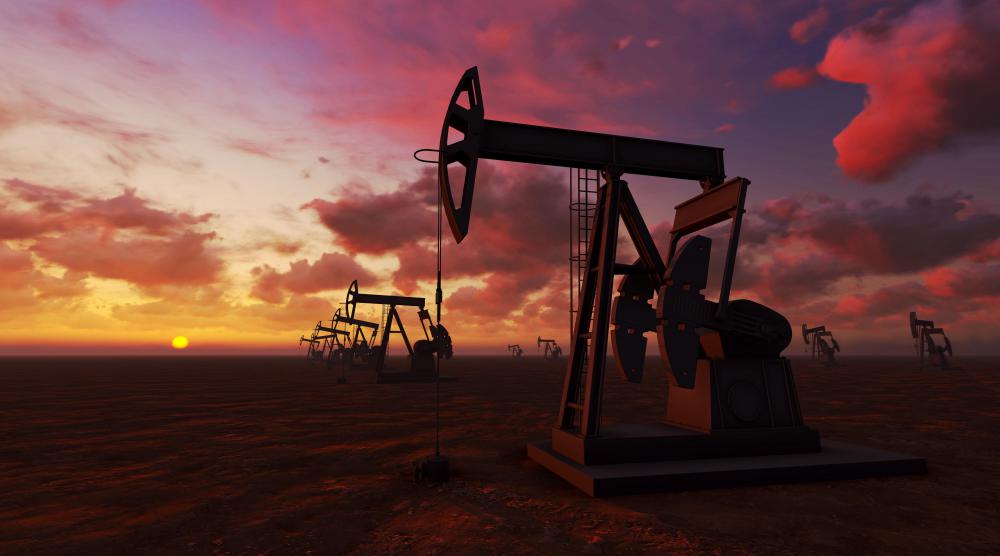At AllThingsNature, we're committed to delivering accurate, trustworthy information. Our expert-authored content is rigorously fact-checked and sourced from credible authorities. Discover how we uphold the highest standards in providing you with reliable knowledge.
What Is Petroleum Conservation?
Petroleum conservation seeks to find ways to cut the consumption of petroleum in one way or another, typically through the application of science and new technologies. This practice is not only a priority of many governments around the world, but also of private groups, who see petroleum use as having a number of negative side effects. The goal, generally, is not to eliminate the use of petroleum resources, but find ways to ensure they last as long as possible. A number of strategies may be employed to meet that objective.
The main strategy employed in petroleum conservation is to look for ways to be more efficient. For example, automobiles are one of the chief areas of focus when it comes to petroleum consumption and energy conservation. Many governments have put certain fuel efficiency ratings into place for automobile manufacturers, and many of those manufacturers seek to produce automobiles that do even better than those minimum standards.

Although not as well known, petroleum conservation also reaches into the industrial sector. Many boilers and other equipment tend to run on oil-based fuels, thus creating increased demand for petroleum. Some countries, such as India, have put a priority on updating this equipment so that consumption is curbed.
Another way many groups have sought to meet the standards of petroleum conservation is through the use of alternative energy sources. This could include electricity, natural gas, solar, and wind energy. To a lesser extent, coal may replace petroleum in some applications, but coal is not considered any less harmful to the environment than burning oil in many cases. Therefore, those who are motivated to conserve petroleum tend to find ways to do it by promoting green resources.
Aside from the environmental factors, shortages of petroleum have become a major motivator for some groups. Some estimates have suggested the world could exhaust economically viable oil deposits within a few decades. Therefore, if other alternative energy sources could be used, it would help to at least push back that date, and prolong the availability of the fuel. It would also give other replacement technologies a better chance of being developed to a practical level.
In addition to perceived shortages, conservation of petroleum also makes economic sense to many people. Petroleum can be a significant operating expense for many businesses. If there is a way to cut consumption of the fuel, then those businesses could also possibly cut costs and become more competitive. The same even applies to individual households. Therefore, petroleum conservation could also help the economy at multiple levels.
Frequently Asked Questions
What is petroleum conservation and why is it important?
Petroleum conservation refers to the practice of using petroleum resources efficiently to ensure they last longer and reduce environmental impact. It's crucial because petroleum is a non-renewable resource, and its extraction and use contribute significantly to pollution and climate change. By conserving petroleum, we can mitigate these issues and transition more smoothly to sustainable energy sources.
How can individuals contribute to petroleum conservation?
Individuals can contribute to petroleum conservation by adopting habits that reduce fuel consumption, such as carpooling, using public transportation, maintaining vehicles for optimal efficiency, and driving at moderate speeds. Additionally, choosing energy-efficient appliances and minimizing the use of plastic products, which are petroleum-based, can further aid in conservation efforts.
What are the economic benefits of conserving petroleum?
Conserving petroleum can lead to significant economic benefits. It can reduce national energy costs, decrease the need for imports, and stabilize fuel prices. According to the U.S. Department of Energy, increasing energy efficiency can save billions of dollars annually. Moreover, it can spur innovation and job creation in alternative energy sectors, diversifying and strengthening the economy.
What role does the government play in petroleum conservation?
Governments play a pivotal role in petroleum conservation through policy-making, regulation, and incentives. They can impose fuel efficiency standards for vehicles, provide tax credits for using renewable energy, and invest in public transportation infrastructure. Governments also fund research and development in alternative energy technologies, helping to reduce the reliance on petroleum.
Can petroleum conservation really make a difference in climate change?
Yes, petroleum conservation can significantly impact climate change. The burning of petroleum fuels is a major source of greenhouse gases, which contribute to global warming. By reducing consumption, we lower these emissions. The International Energy Agency has reported that energy efficiency improvements could deliver over 40% of the greenhouse gas reductions needed to meet global targets.
What are some challenges faced in the implementation of petroleum conservation measures?
Challenges in implementing petroleum conservation measures include economic dependency on oil revenues in certain regions, consumer resistance to changing habits, and the initial cost of transitioning to more efficient technologies. Additionally, there's often a lack of awareness about the importance of conservation and the availability of alternatives to petroleum-based products and energy sources.
AS FEATURED ON:
AS FEATURED ON:











Discuss this Article
Post your comments